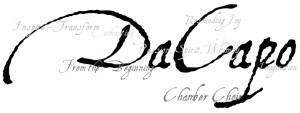Saturday evening was the the DaCapo Chamber Choir’s opening concert and it was, in a word, brilliant. Their concerts are always beautifully sung and thoughtfully programmed, but at Saturday’s concert at St. John the Evangelist Anglican Church in Kitchener, the stars aligned to create something truly special.
This is my third season covering DaCapo and in each concert director Leonard Enns has gently and quietly experimented with the traditional piece-applause structure. Themes are usually big ideas (love, fire, the number three), which gives Enns tremendous flexibility when choosing repertoire. Saturday’s concert was called “Cry Out — music of lament and the struggle for hope.”
In an effort to keep the concerts from becoming too abstract, Enns often uses a solo instrumentalist as a sort of palate cleanser.
Sometimes these ideas work better in theory than practice. Saturday night demonstrated the rewards of seeking out these types of collaborations.
Cellist Simon Fryer opened the concert with the Prelude from Bach’s Cello Suite No.2. Seated in the middle of the church in front of the Quire, Fryer let the piece unfold as if it was an improvisation.
Two settings of the Psalm text Hear My Prayer followed; the first by Enns and the second by Canadian composer Stephanie Martin. Enns knows his choir well and trusts them with the most delicate pianissimos.
Martin’s piece was more traditional in its voicing with shades of Benjamin Britten in the harmony.
Fryer joined the choir again for Exaudi by another Canadian composer Jocelyn Morlock. It’s also a setting of the Hear My Prayer text but this time the In Paradisium part of the Requiem Mass is tacked on the end, adding a sense of finality to the piece. The cello is set against the choir and at first occupies the furthest reaches of dissonance. As the piece progresses, the two groups come closer and closer harmonically until they meet at the last line — may you have eternal rest.
Iranian composer Iman Habibi explores the futility of war and questions its glorification in his piece None But Death. Habibi shuns the contemporay choir cliche and scores the ensemble the way one would for an instrumental concerto. The soloist in this case was DaCapo soprano Cher Farrell. Pitch perfect throughout her entire range with tone that is both warm and clear, Farrell is a rare find in the world of amateur singing.
Two samplings from the choir’s new disc ShadowLand were an excellent advertisement. There are some new faces in the choir this year, which have strengthened an already excellent group. Each singer is confident in their part and in fine vocal shape. With no technical constraints and a visionary director, DaCapo is easily the best choir in the area.
Many choirs sing great rep, musically and well in tune. DaCapo’s greatest achievement is that rather than singing music for the audience, as is usually the case, it always feels as though we are experiencing the music together — and that’s something very special indeed.



